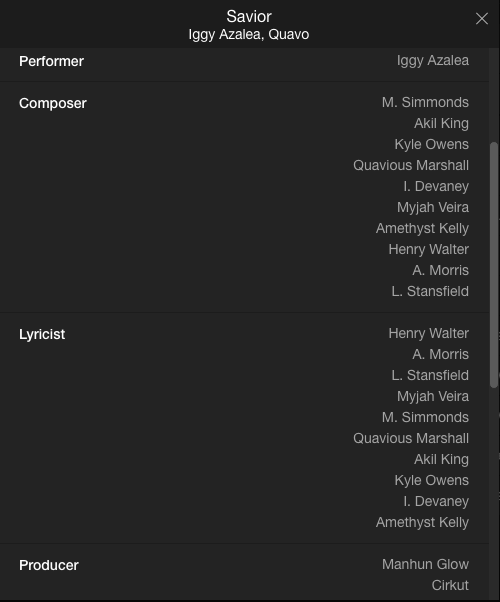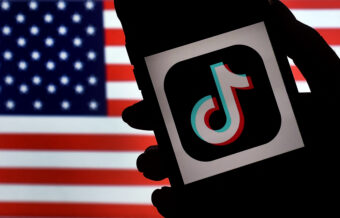Last week, Iggy Azalea released a new single called “Savior,” a bubbly track featuring Quavo that interpolates Lisa Stansfield’s 1989 hit “All Around the World.” The song received a Super Bowl ad placement and was met with a relatively warm reception—surely a relief for Azalea, who saw her 2017 singles (“Switch” and “Mo Bounce”) flop so badly that her sophomore album Digital Distortion was called off altogether. Azalea needs a savior herself, but the story of her new single is far from simple.
Ahead of the song’s release, fans noticed an unexpected name listed in the songwriting credits: Lukasz Gottwald, a.k.a. Dr. Luke, who’s become a public pariah in the years since since Kesha accused him of rape and abuse in 2014. Once the most celebrated songwriter and producer in the world, Luke has essentially been exiled from pop music, logging only a few minor credits in 2017 on songs by artists like Ne-Yo, Trey Songz, and Big Boi. When questioned by a fan who first spotted Luke’s name in the “Savior” credits available on Tidal, Azalea distanced herself and her new song from the disgraced producer. “It’s produced by [Cirkut] and another kid MHL who have production agreements with Luke,” she wrote in a now-deleted February 1 tweet, which was captured by the blog That Grape Juice. “Their deals and who they are tied in business wise in no way make ME ‘working’ with Dr Luke. Try again.” Azalea’s clarification amplified news of the alleged mistake, which subsequently found its way to outlets including Pitchfork and Idolator.

In displaying songwriting and production credits, streaming services rely on information given to them by labels. On February 2, Dr. Luke’s name was no longer listed on Tidal, and a source close to the situation at Tidal confirmed to Spin that Luke’s name was removed from the credits intentionally. (Spotify, which only recently added writing and production credits to its interface, still lists him as a co-writer.) The official duty of monitoring licensing and royalties on artists’ behalf falls to the major publishing companies, and to nonprofit rights-management organizations such as ASCAP, which track who contributed what to each song. Dr. Luke is an ASCAP member, and its database still lists him as a co-writer of “Savior.”

The question of who exactly worked on “Savior” does not end there. On both Tidal and Spotify, the producers of the track are listed as Cirkut and Manhun Glow. Cirkut, born Henry Walter, is a ubiquitous pop producer who rose to prominence alongside Dr. Luke in the early part of the decade. Together, the duo created songs like Miley Cyrus’ “Wrecking Ball,” Pitbull’s “Timber,” and Rihanna’s “Where Have U Been”; they also produced albums like Katy Perry’s Prism and Kesha’s Warrior nearly in full alongside fellow pop songwriting titans like Max Martin and Benny Blanco.
Manhun Glow, on the other hand, does not have any other songwriting credits under that name, or any online presence to speak of—a Google search for the name doesn’t return a single hit aside from news posts announcing the existence of “Savior.” The only time the name has ever been tweeted is this. On Facebook, there are a few profiles belonging to people with the first name “Manhun,” but none with the last name “Glow.” If anyone named Manhun Glow exists, we weren’t able to find a single reference to them. And then there’s the fact that if you move the “G” in “Glow” to the end of “Manhun,” you get a very obvious dick joke that begins to feel less like an obfuscating pseudonym and more like a provocation.
So we’re left with two sets of questions that, the longer they linger, may not be as separate as they appear:
- Why was Dr. Luke initially listed as a songwriter on “Savior,” and why was he removed, at least by Tidal?
- Who is Manhun Glow, and why is that person’s identity being concealed by the sort of joke a 12-year-old might come up with?
It’s possible that Dr. Luke somehow received a songwriting credit for “Savior” entirely by accident, or that the information provided to streaming services was incorrect, though given that his name still appears on ASCAP, either theory seems like wishful thinking. It’s also possible, as Azalea seemed to suggest in her tweet, that some term of Cirkut’s deal with Prescription Songs, the publishing company founded by Luke, requires that Luke receive a songwriting credit in his own name, though that would be a highly unusual arrangement, and one not borne out by the myriad of songs Cirkut has produced on his own, without Luke’s name attached, while being signed to Prescription Songs.
If Luke really did work on a piece of the song, it may have been years prior to it becoming part of Iggy Azalea’s attempted comeback single. Given the way many pop songs of this stature, especially within the Dr. Luke universe, are created—with writers asked to add a line or melody here, or to tinker with just the bridge or the post-chorus there—this explanation seems most likely. It would also mean that Azalea, who has supported Kesha publicly, may not have even been aware that Luke once had a hand in the song.
But none of that addresses the mystery of Manhun Glow—or the person Azalea called MHL, which is not an acronym for “Manhun Glow” but would be for “Man Hung Low,” the most direct version of the joke. (MHL is tougher to search, but we still couldn’t turn up a single credit for anyone using that name.) It’s possible, of course, that there is some musician out there really going by Manhun Glow, who has no online presence whatsoever, loves dick jokes so much that they adopted one for their professional name, and tallied the first production credit of their life on a new Iggy Azalea single. But that explanation stretches credulity.
Left with no evidence of this person’s existence, it seems fair to assume that Manhun Glow is an alias for someone else. Perhaps it is a pseudonym for Dr. Luke, devised as a way to conceal his involvement—until his actual name was accidentally left in the writing credits. Or maybe it’s another famous musician who wanted their name redacted for some reason. This tactic wouldn’t be entirely novel: Taylor Swift used the pen name Nils Sjöberg to initially conceal her hand in writing Calvin Harris and Rihanna’s “This Is What You Came For.”
It may also be worth noting that those recent Luke credits—the ones for Ne-Yo, Trey Songz, and Big Boi—all came along with Cirkut, who has also recently worked with Luke in developing the aspiring pop star Kim Petras. Nowadays when Luke happens to pop up on a song by a major artist, it’s almost always with Cirkut by his side.
Cirkut declined to comment for this story. Multiple inquiries to Azalea’s label Island Def Jam and to Prescription Songs have gone unanswered. If you have any information on Dr. Luke’s involvement with “Savior,” email [email protected].





